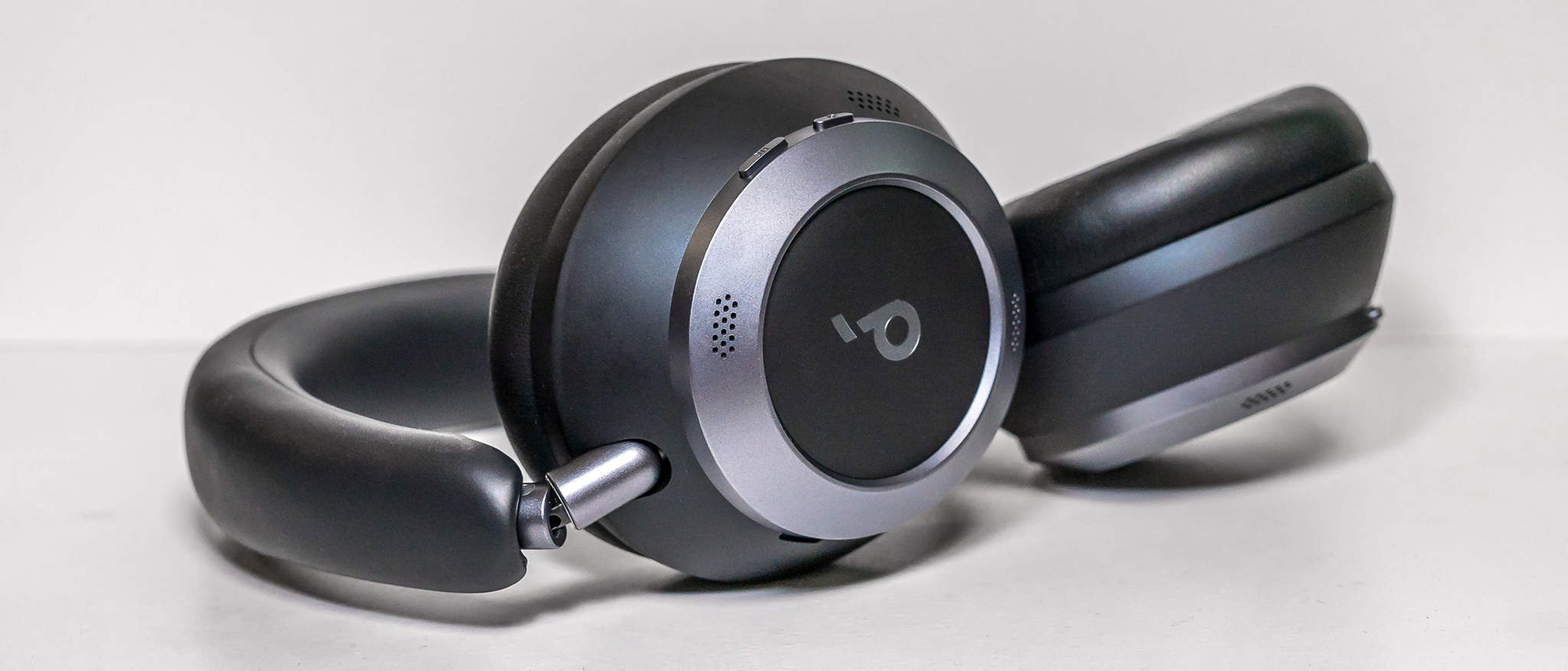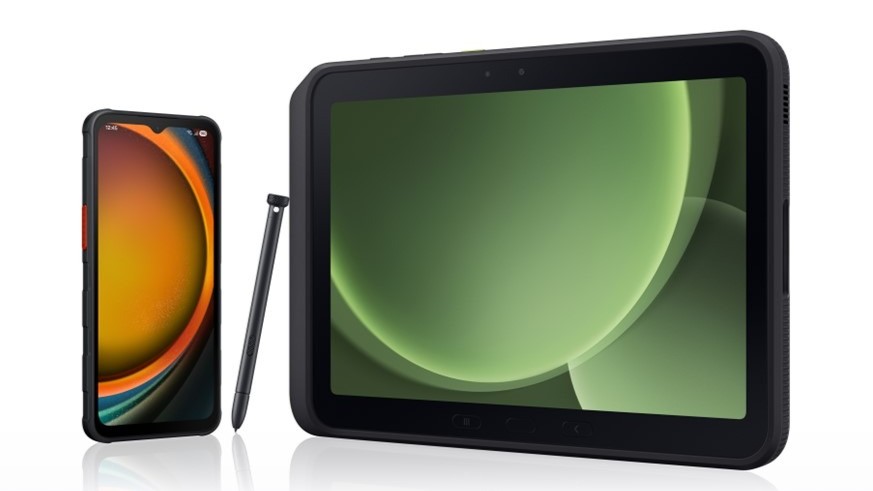Android Central Verdict
Anker doesn't usually make headphones that play against more expensive pairs on the same terms, but the pricier Soundcore Space One Pro stand out more for the bass they pump out.
Pros
- +
Solid bass response
- +
Very comfortable fit
- +
Good ANC performance
- +
Good call quality
- +
Excellent app support
- +
Reliable battery life
Cons
- -
No hard case included
- -
No IP rating or protection
- -
No USB-C wired playback
- -
A little flimsy for headphones at this price
Why you can trust Android Central
Anker and its Soundcore brand usually play in a more budget-friendly space where its audio products punch up against more expensive competition. By undercutting the bigger names with solid quality, it's been able to stand out in a crowded field without breaking the bank.
The Soundcore Space One Pro stretch that proposition to a point where affordability is more relative. In other words, you have to pay more for these headphones under the impression that you're getting awesome performance for less than the best pairs generally sell for. Do they deliver? Let's find out.
Anker Soundcore Space One Pro: Price and availability
Anker released the Soundcore Space One Pro headphones in September 2024, and they are pretty easy to find, mostly online over brick-and-mortar stores. These are something of a first for the company, so it's hard to tell when it might launch a newer version. Chances are, they will be available for quite a while. They start out at $200, though discounts could always happen down the road.
Anker Soundcore Space One Pro: What's good
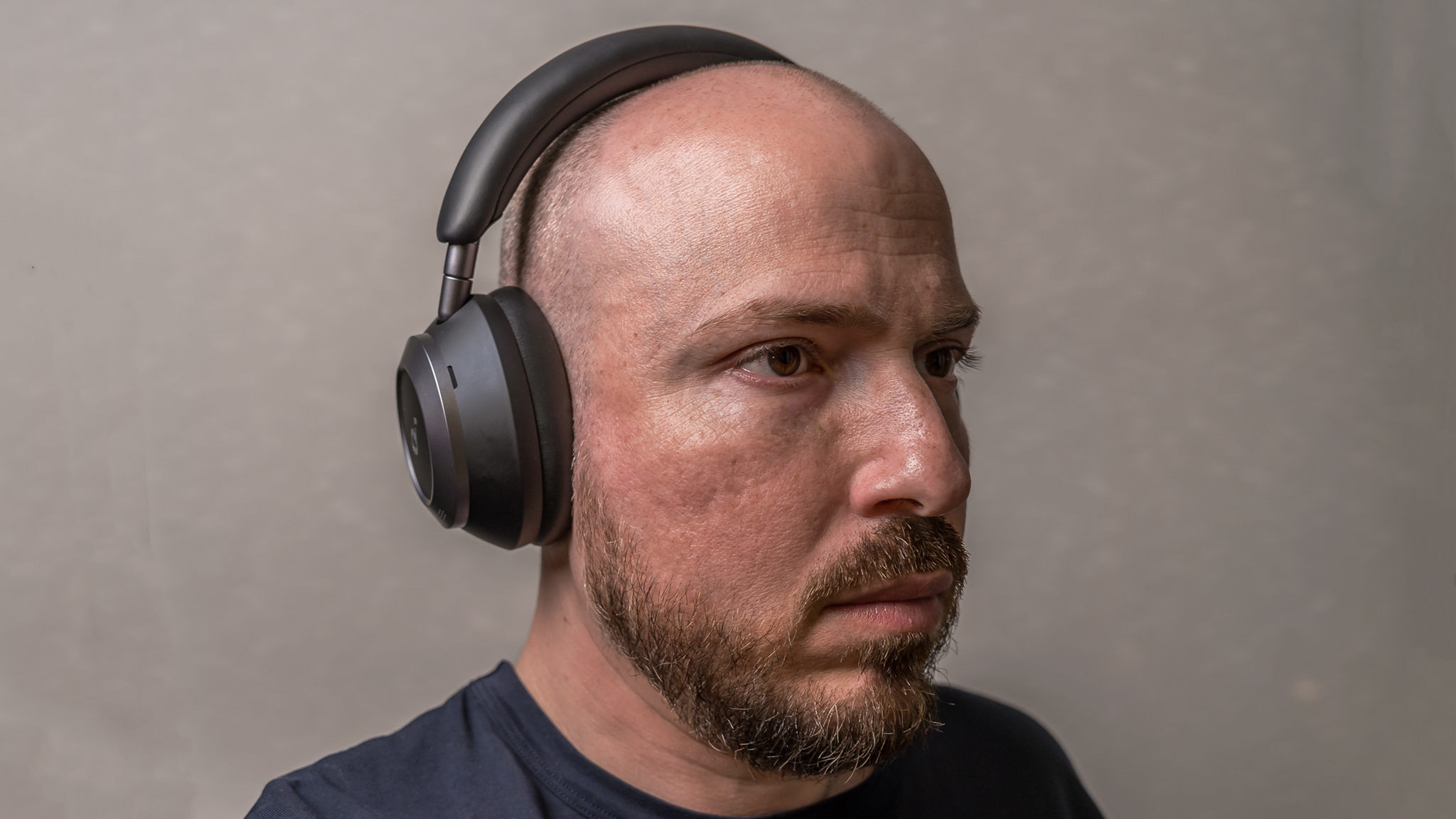
The Space One Pro headphones are supposed to be a more refined and advanced version of the $100 Space One. They share similarities in design but diverge in a couple of ways. One is the ear cups swivel 180 degrees, and the other is there are hinges that let them fold in, making this one of the easiest pairs to contort for storage or travel. The downside is you only get a cloth bag instead of a hardened case to keep them in.
The ear cushions are nice and plush, settling in nicely once you put the headphones on. They're also large enough to create a tighter seal around your ears. Not to mention how soft the headband is. Considering the lightweight body, these should feel comfortable right after putting them on.
Just don't expect them to look svelte on your head. The ear cups are a bit thick, and while there are color options to choose from, the overall aesthetic here leans more towards function than fashion.
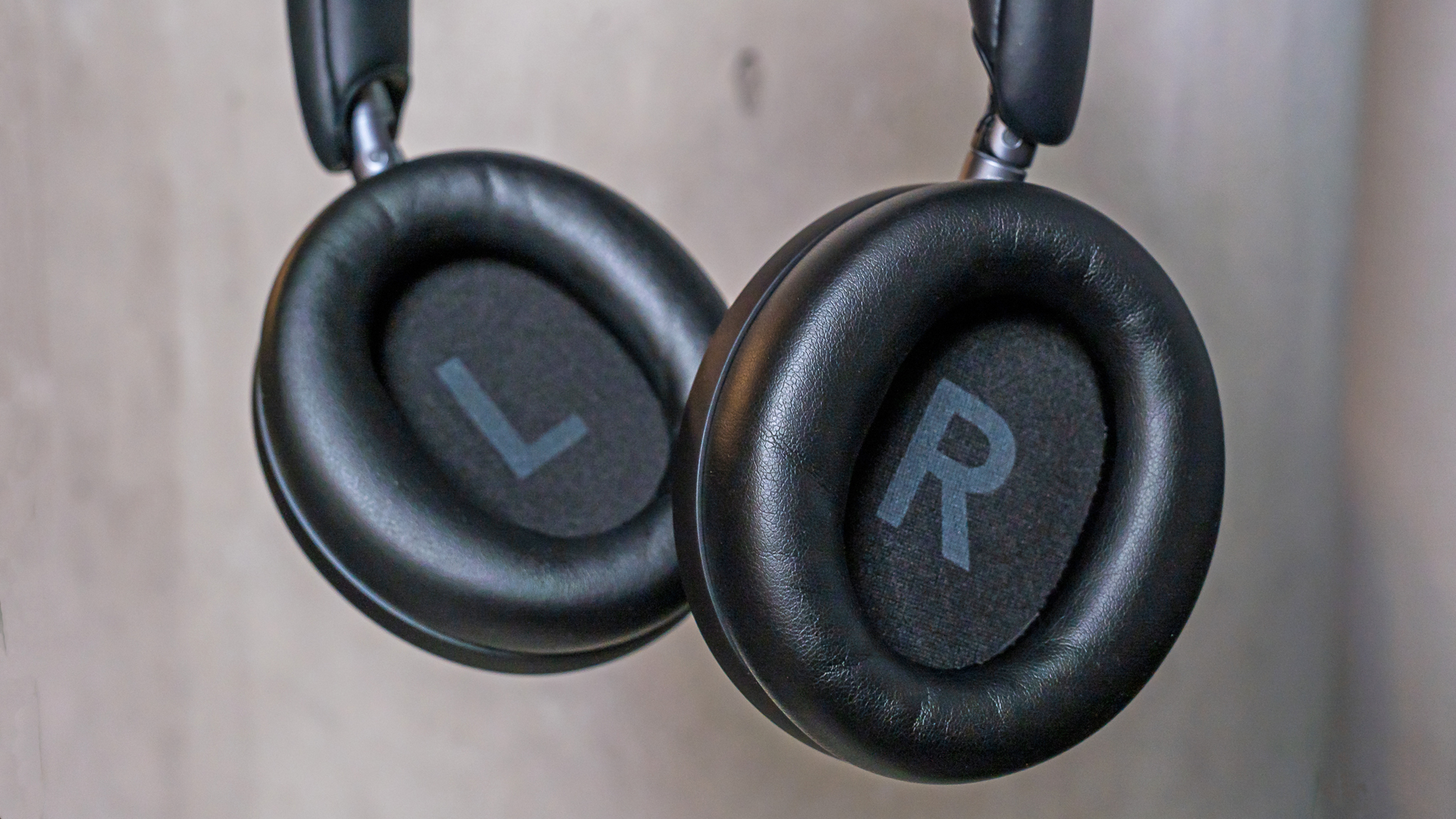
It's just as well since Anker loads up the Space One Pro with a number of features. For starters, the Soundcore app presents an array of custom options and settings you can use to your advantage. That includes an EQ to tune the audio, adaptive active noise cancelation (ANC), and a series of specific settings that apply to connectivity and phone calls.
This isn't unusual for Soundcore headphones. Anker has long packed its app with supporting features to make them more adaptable. In this case, it also tries to expand the audio menu by including support for the LDAC hi-res Bluetooth codec on top of the standard SBC and AAC. You have to turn that setting on in the app, and when you do, it forces a restart, so it's something you commit to each time you use it.
Mind you, it's only worth using if you're listening to tunes from sources that can give you hi-res audio, like Tidal, Amazon Music, Apple Music, or Qobuz.. Either way, Anker didn't tune the Space One Pro to necessarily sound like balanced cans anyway. They are decidedly bass-friendly with the "Soundcore Signature" EQ preset signifying what the sonic focus is here.
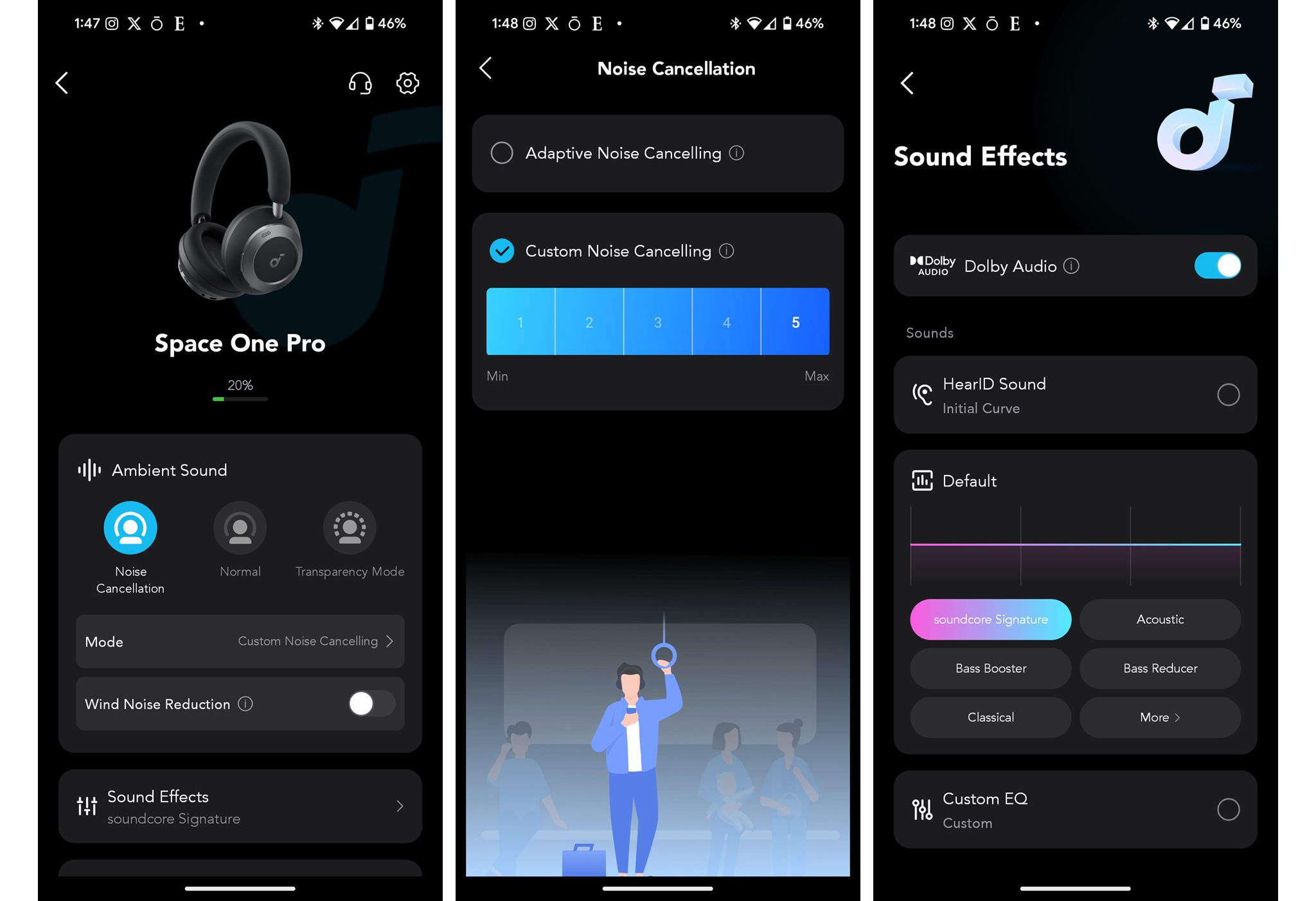
I don't say that to knock these headphones, just to measure expectations going in. If you like some bass but really want to pull out detail in the mids, you're better off tweaking the EQ and creating a custom preset for yourself. There are over 20 to choose from off the bat but I'm not convinced most will hit the spot for a lot of listeners.
You could also give HearID Sound a try, a quick sound test (in quiet settings) that lets you choose from a series of two different audio tuning options while listening to them. It takes the data and formulates a custom EQ setting based on the results. I actually had better luck with the EQ, personally.
These do sound like $200 headphones — even more so when you tinker and find the sounds that appeal most to you.
What you can expect is some solid clarity and vibrant highs to go with the thicker sound. These do sound like $200 headphones — primarily when you tinker and find the sounds that appeal most to you. LDAC support is great, and really does add something different when the source material is good. I recommend playing around with the EQ because it also pays dividends for content like podcasts and audiobooks where too much bass isn't necessary.
The Space One Pro support Dolby Audio but not Atmos. Nor is there any true spatial audio here. Not a big loss if you're not into that sort of thing, but something to point out since some competitors offer that in the same price range.
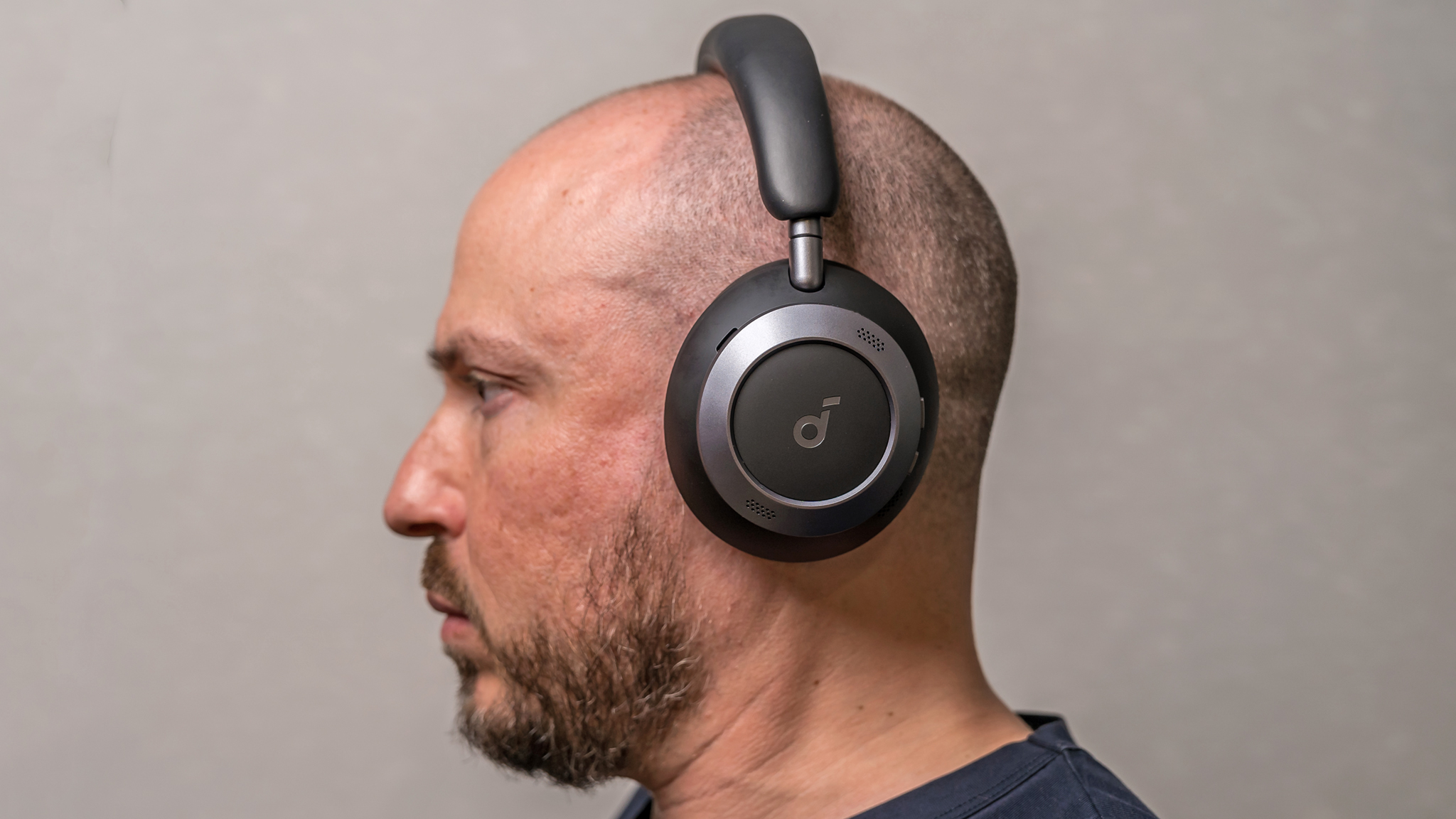
ANC gives you five levels of potency as a convenient way to keep it going without needing its full effect. Regardless of which number you choose between one and five, noise-cancelation is more effective with low-frequency sounds. That tracks with Anker's performance in this area, as I've noticed similar results with its other headphones and earbuds as well.
It makes the Space One Pro perfectly fine on a commute where you want to drown out the hum of a plane or train, but they won't be as effective with high-frequency sounds, which you'll notice walking past a construction site, among other situations. For a bigger boost, turn on Wind Reduction to drown out more.
The passive isolation from the ear cushions plays a big role. You can tell by simply talking while wearing them with no audio. The muffled sound is indicative of a tighter seal helping ANC do its thing more effectively.
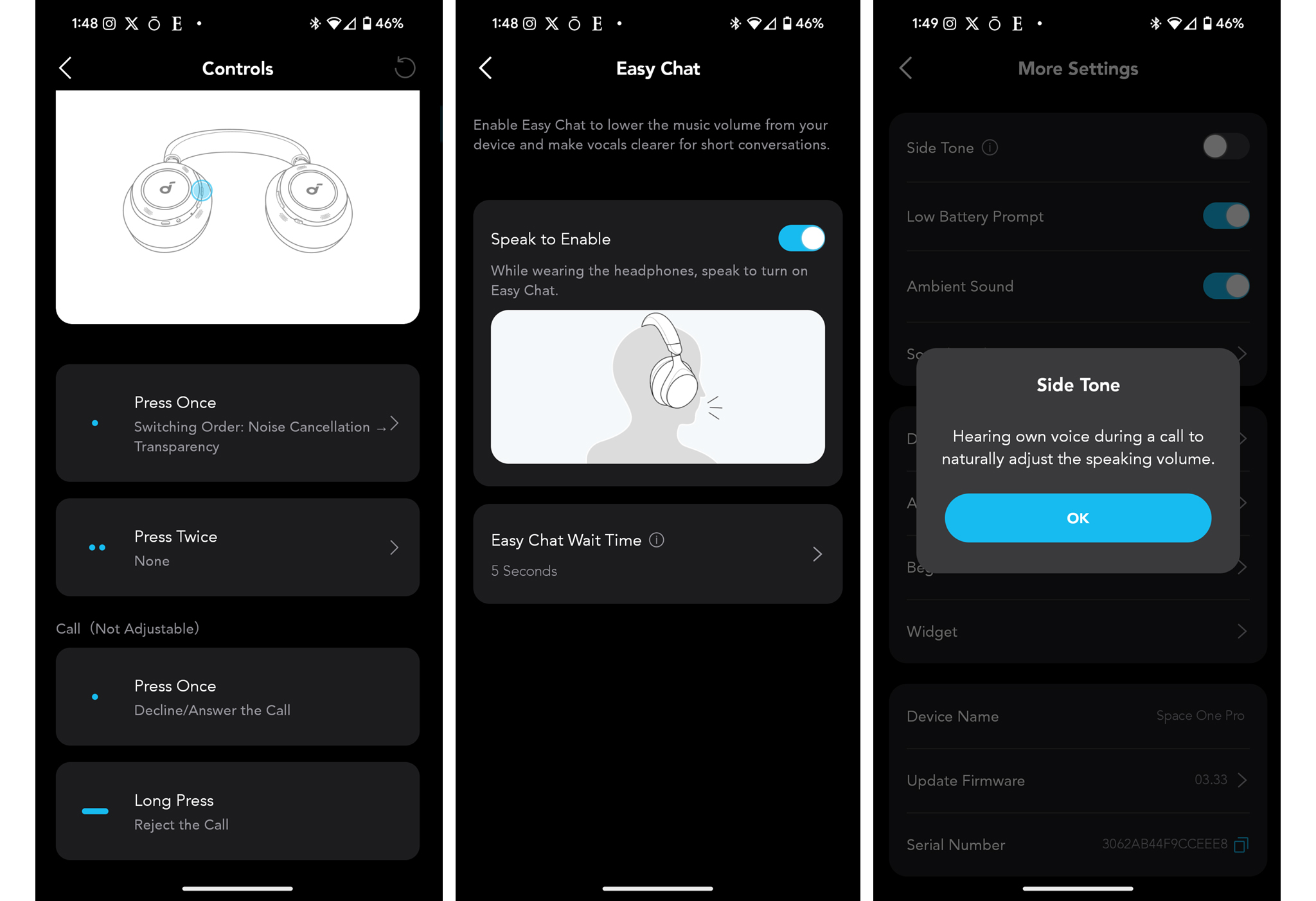
Speaking of voice, Anker wisely addresses communication and phone calls with neat features. Easy Chat is one of my favorites because it lowers the music volume once I start talking, making it possible to hear someone say something brief in response without touching the controls. By default, the audio returns to its previous volume after five seconds but you can also choose 10- or 15-second delays.
Another is Side Tone, which helps you hear your own voice during a call so you're not speaking louder than normal. You'll find that under More Settings.
These features grow in importance since call quality is quite good under varying circumstances. Quiet rooms are no problem, while busier environments don't get in the way of both sides hearing each other. It's always a plus when you can wear over-ear headphones while walking outside and still have a chat despite the street noise. Transparency mode is great for when you want to listen to something while knowing your surroundings as well.
Multipoint support ensures you can stay connected to your phone and another device at the same time. It's a common feature for headphones at this price but Anker has long offered it in budget pairs, too.
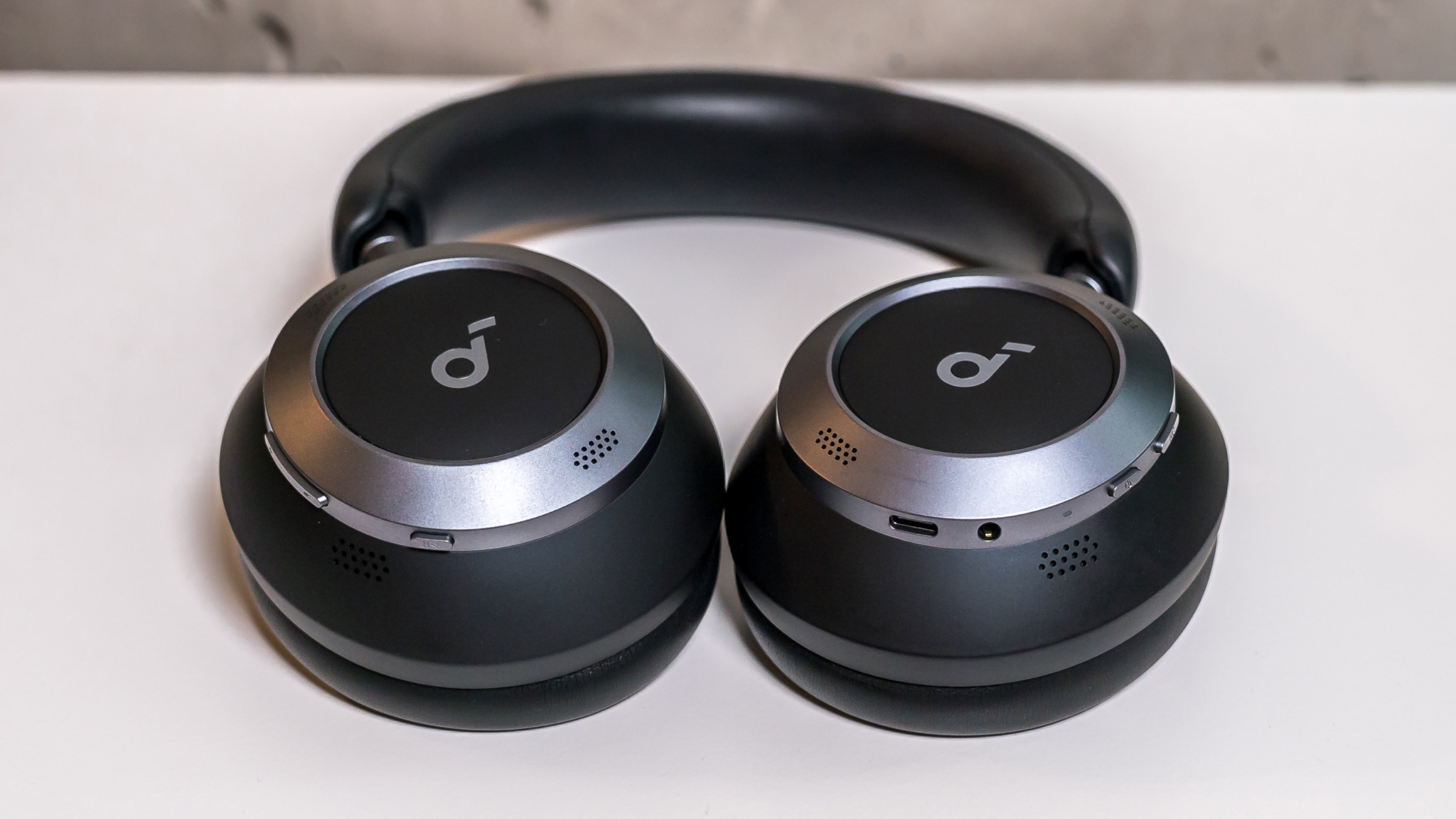
The lack of touch controls may bother some but certainly didn't bother me. I like the tactile feel of physical buttons because they're generally more reliable for certain controls, like volume or skipping tracks.
The NC button on the left cup cycles through ANC and Transparency, or it can answer/reject an incoming call. Press it twice and you can toggle BassUp as a boost. The play/pause button on the right plays/pauses with a single press, while holding it for two seconds wakes your voice assistant. The volume buttons also let you skip a track or go back one when you long press them.
As for battery life, Anker claims 40 hours with ANC on and 60 hours with it off. These numbers hold but only if you don't raise the volume too much and use the LDAC codec sparingly.
Anker Soundcore Space One Pro: What's not good
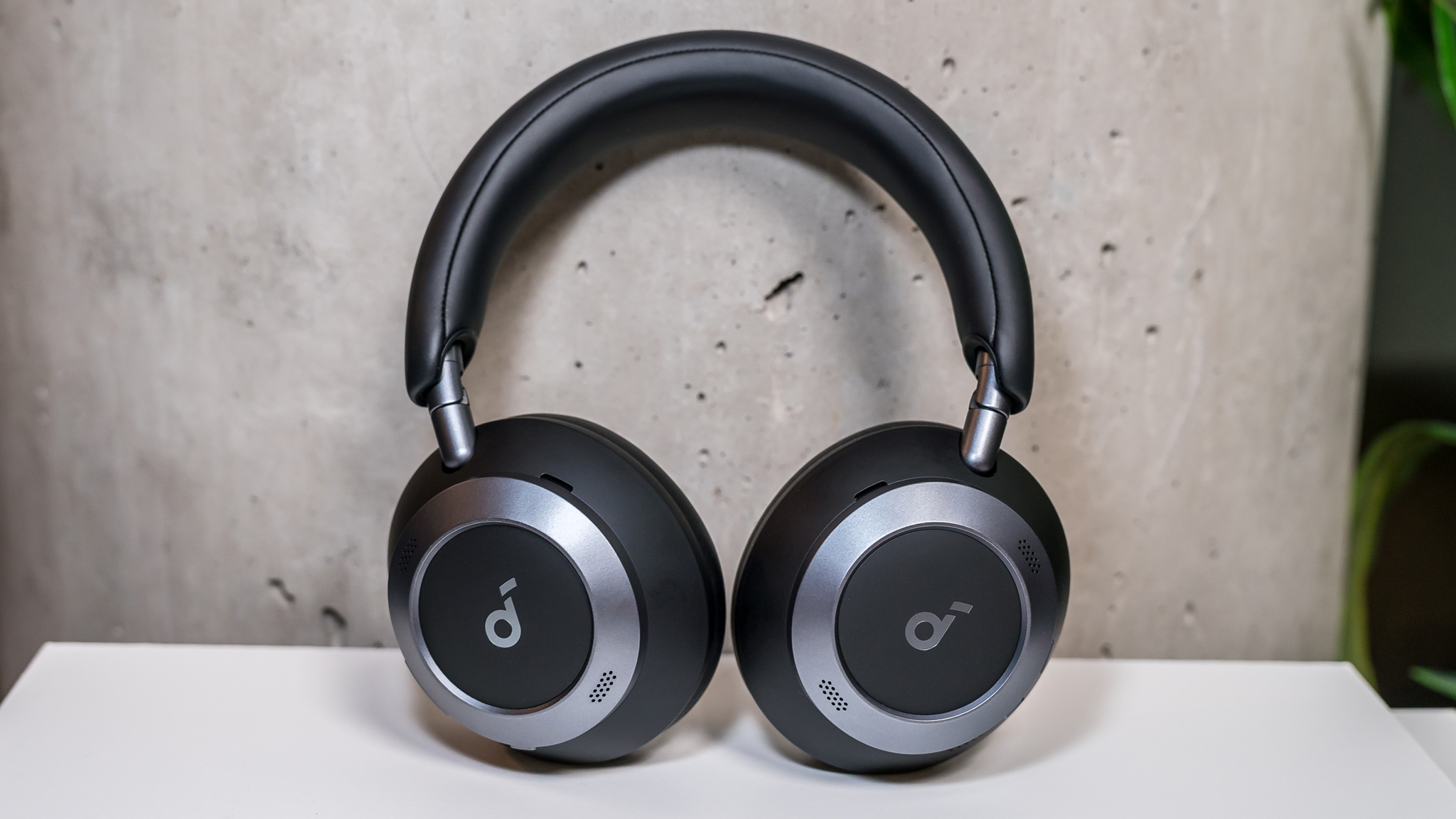
It's a shame Anker didn't consider including a hard case to go with these headphones. It sends a strange signal to consumers when you launch something more expensive than your brand is known for, yet cheapen out on the very thing that serves to protect it. Clearly, it's a cost-cutting move but it sends a weird message when less expensive Soundcore headphones come with hard cases.
The Space One Pro also have no IP rating, so I would caution against using these at the gym for sweaty workouts. It's just hard to tell whether they can sustain that kind of exposure over time.
It's great that you get wired playback here, including a 3.5mm cable. Not to mention that ANC works while using it too. The downside is Anker doesn't replicate the experience with the USB-C port, so if you want to use it to listen through your phone or tablet to reduce latency, you'll have to use an adapter instead.
Anker Soundcore Space One Pro: Competition
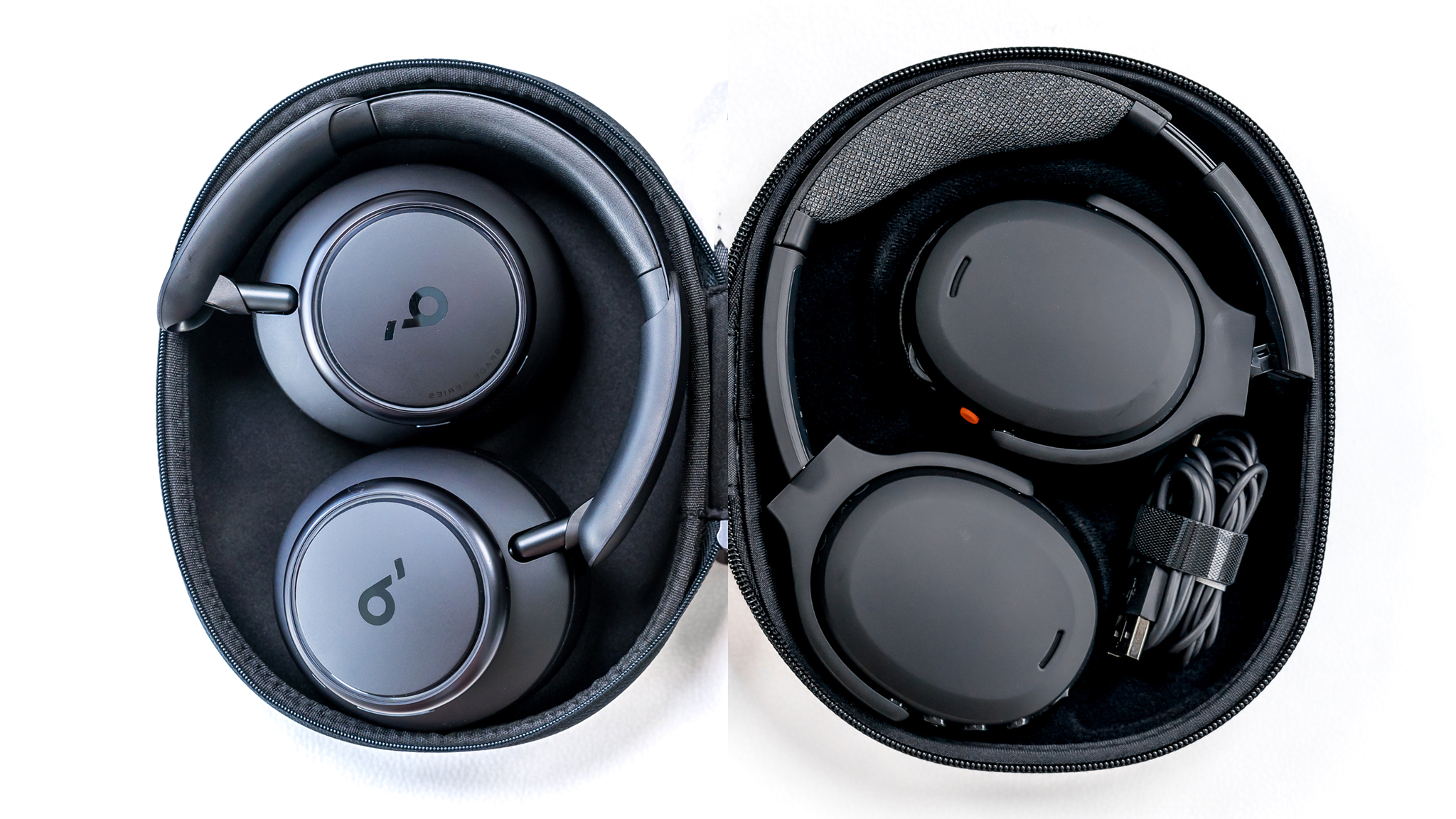
You have a lot to consider when you're ready to plunk down $200 for a pair of over-ear headphones. This is a competitive price range, and while the Space One Pro won't necessarily unseat the big boys among the best wireless headphones, the previous Space One make the cut as an excellent budget choice for $100 less. Even within Anker's own lineup, the Soundcore Space Q45 are still viable if your needs aren't too specific.
Since bass is a standout here, you can also look at the Skullcandy Crusher ANC 2 as a pair in the same pricing ballpark. They have ridiculous levels of bass and deep app support rivaling what Anker delivers. The Sennheiser Accentum Plus aren't far off in price but veer far more toward balanced sound, if you want a pair less predisposed to rumbling bass out of the box.
Anker Soundcore Space One Pro: Should you buy them?
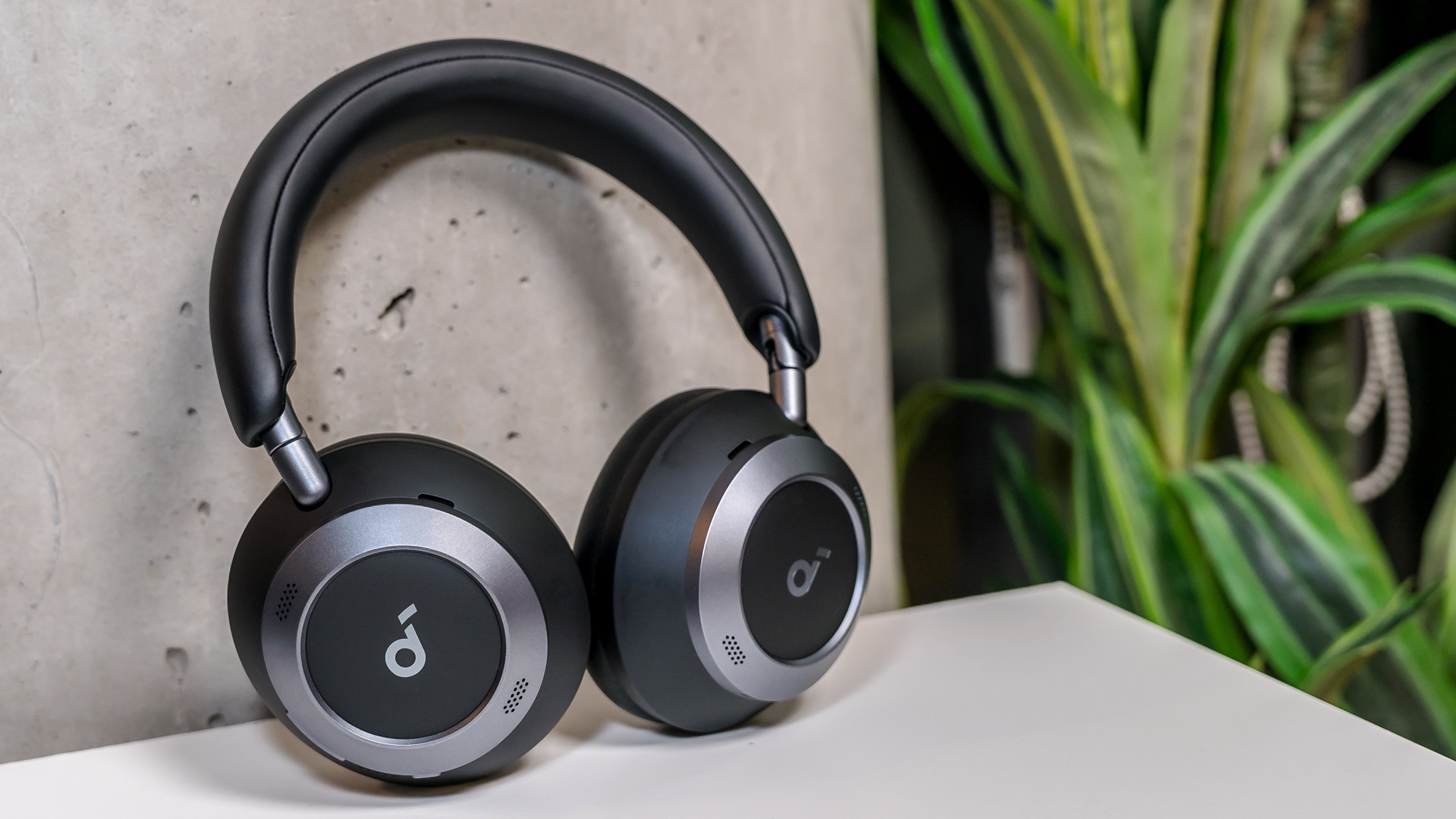
You should buy these if...
- You want plenty of bass.
- You want a comfortable fit with physical buttons.
- You like hi-res audio support.
- You want excellent app support.
You shouldn't buy these if...
- You want a hard case to carry them.
- You want something more rugged for workouts.
- You want wired USB-C playback.
It's hard for me to settle on a score for the Soundcore Space One Pro because they offer plenty, but also don't bring much that feels new or intriguing to one's ears. That's also because Anker has built a solid foundation in undercutting the competition with real bang for the buck. In this case, the company is asking for more money up front without setting a new tone in more competitive terms.
These headphones have plenty of custom features and perform well enough to warrant their cost — but only if you're looking for headphones that give you the bass you might be looking for.
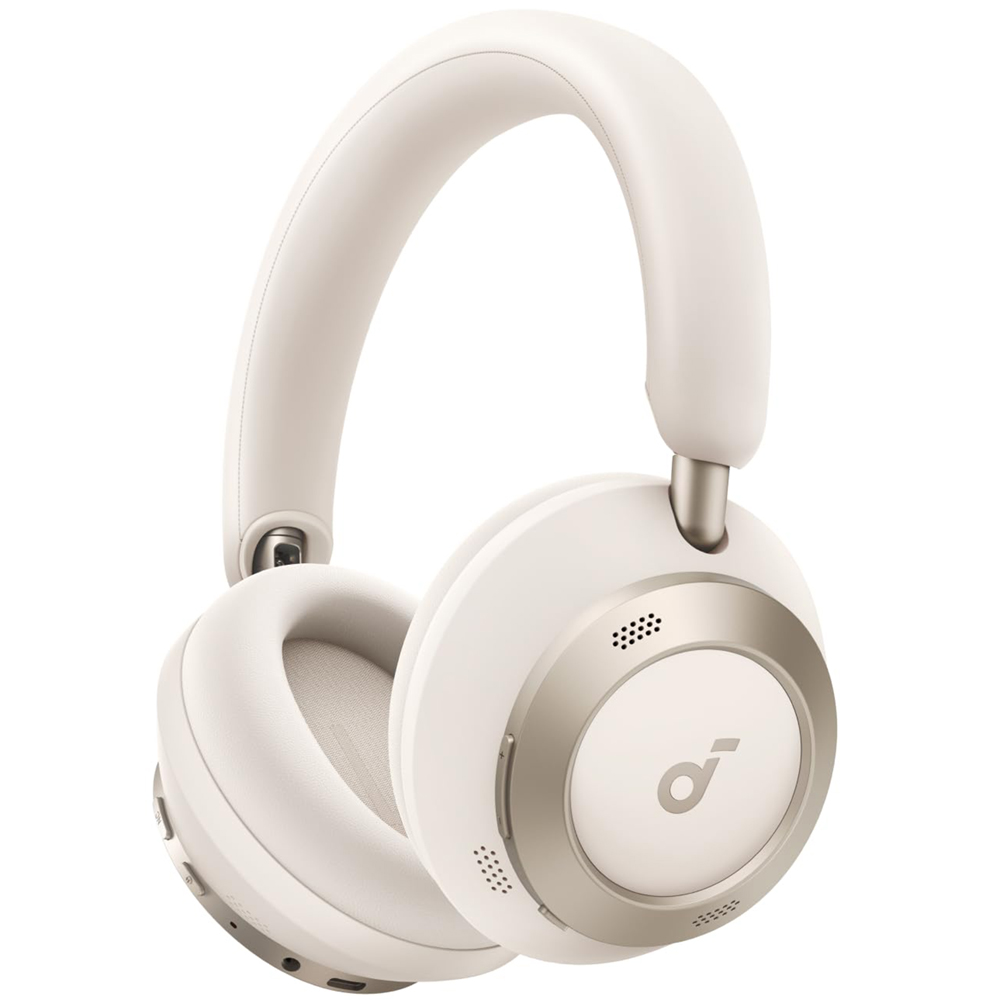
Pump up the bass
The Anker Soundcore Space One Pro make some design changes on the outside while bumping up the bass response on the inside.

Ted Kritsonis loves taking photos when the opportunity arises, be it on a camera or smartphone. Beyond sports and world history, you can find him tinkering with gadgets or enjoying a cigar. Often times, that will be with a pair of headphones or earbuds playing tunes. When he's not testing something, he's working on the next episode of his podcast, Tednologic.
You must confirm your public display name before commenting
Please logout and then login again, you will then be prompted to enter your display name.
